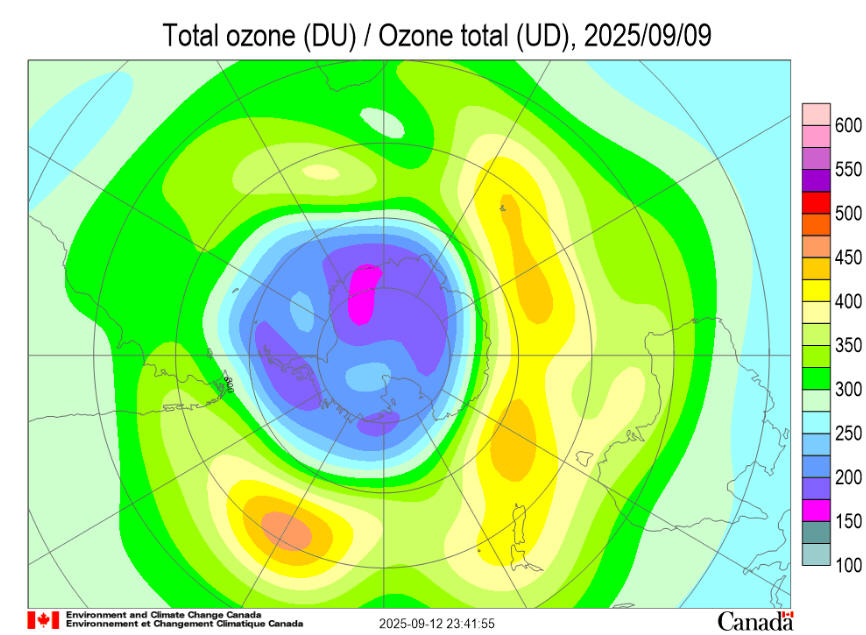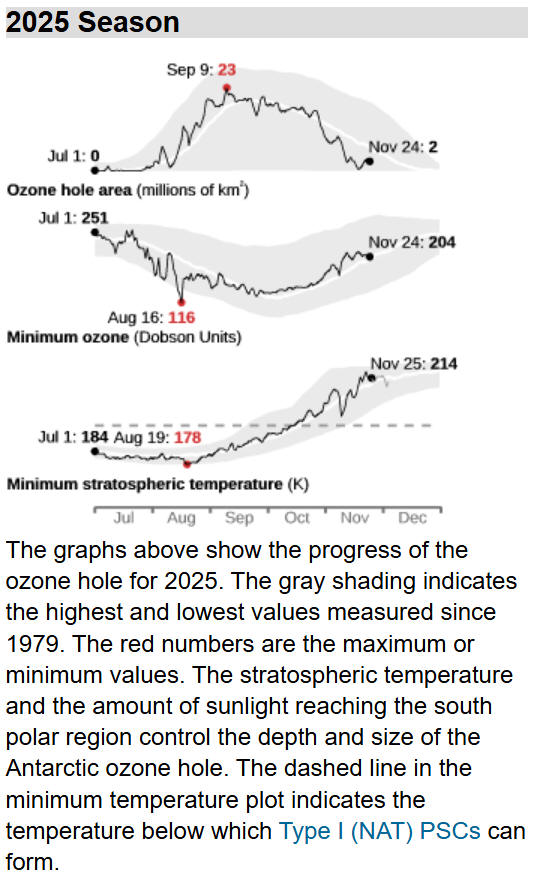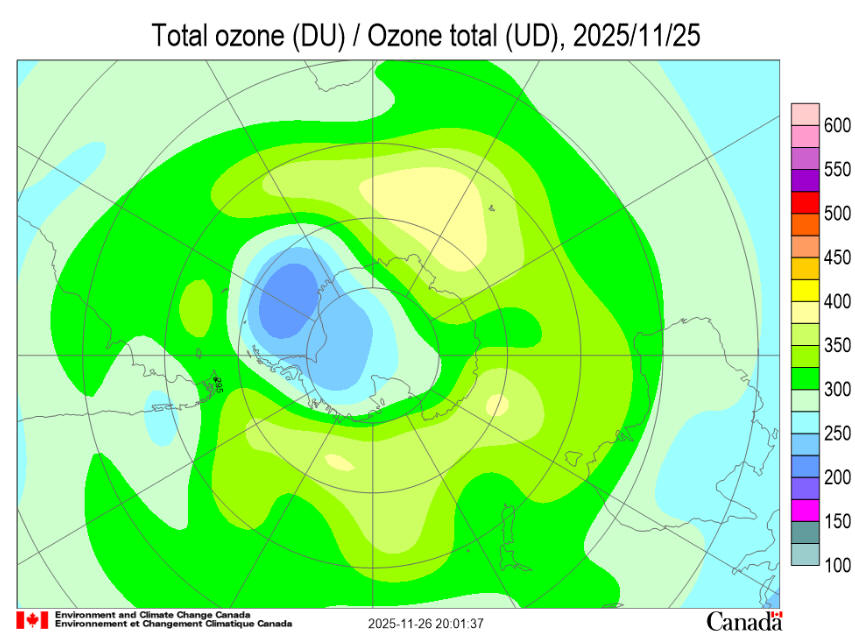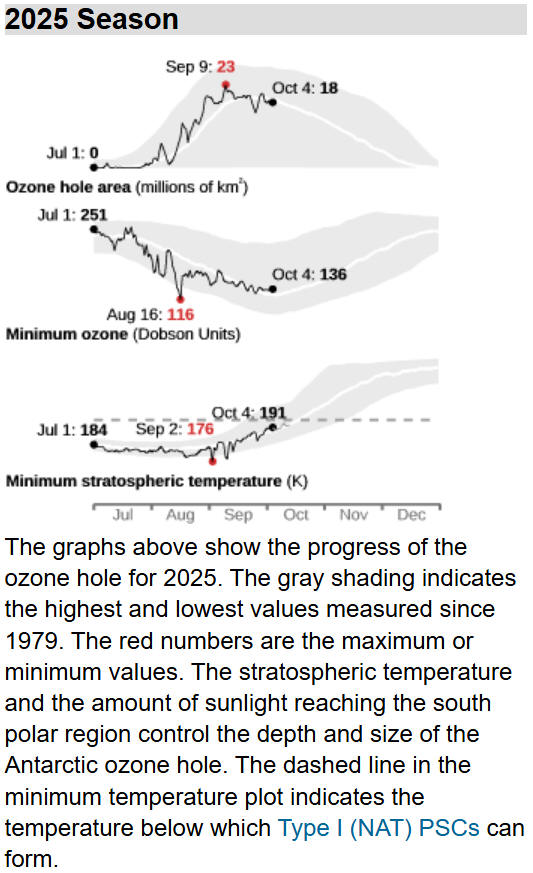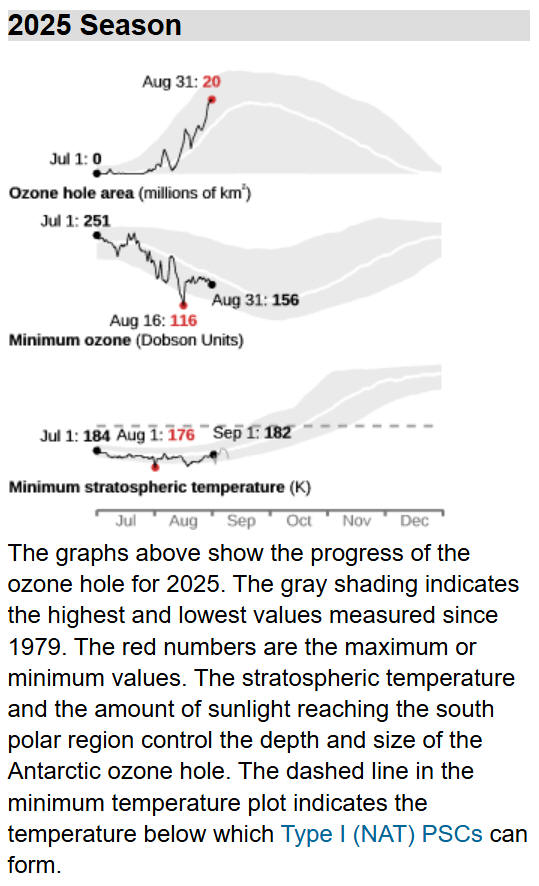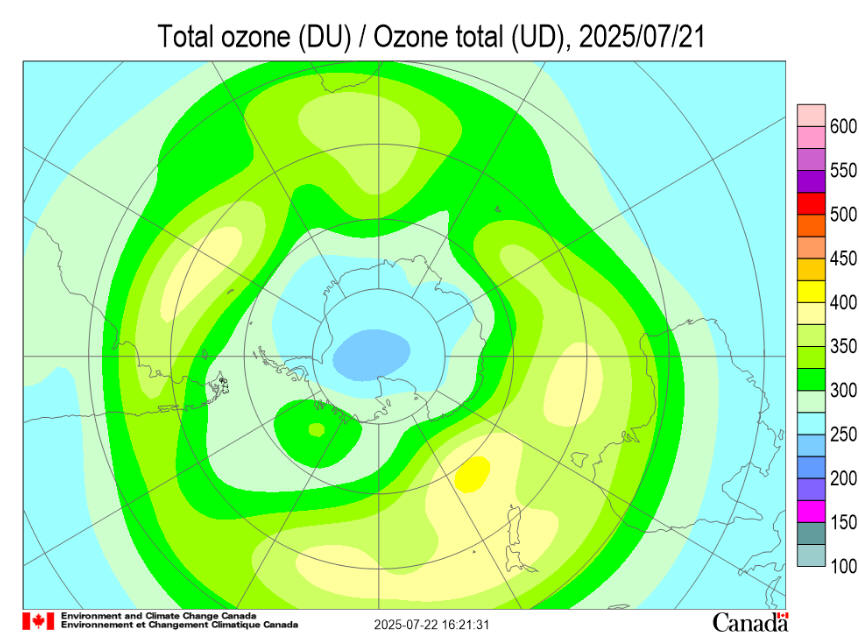|
The Ozone Hole 2025 NASA, NOAA Rank 2025 Ozone Hole as 5th Smallest Since 1992 Sally Younger Nov 24, 2025 Article While continental in scale, the ozone hole over the Antarctic was small in 2025 compared to previous years and remains on track to recover later this century, NASA and the National Oceanic and Atmospheric Administration (NOAA) reported. The hole this year was the fifth smallest since 1992, the year a landmark international agreement to phase out ozone-depleting chemicals began to take effect. At the height of this year’s depletion season from Sept. 7 through Oct. 13, the average extent of the ozone hole was about 7.23 million square miles (18.71 million square kilometers) — that’s twice the area of the contiguous United States. The 2025 ozone hole is already breaking up, nearly three weeks earlier than usual during the past decade.
The hole reached its greatest one-day extent for the year on Sept. 9 at 8.83 million square miles (22.86 million square kilometers). It was about 30% smaller than the largest hole ever observed, which occurred in 2006, and had an average area of 10.27 million square miles (26.60 million square kilometers). “As predicted, we’re seeing ozone holes trending smaller in area than they were in the early 2000s,” said Paul Newman, a senior scientist with the University of Maryland, Baltimore County, and leader of the ozone research team at NASA’s Goddard Space Flight Center in Greenbelt, Maryland. “They’re forming later in the season and breaking up earlier. But we still have a long way to go before it recovers to 1980s levels.” NASA and NOAA scientists say this year’s monitoring showed that controls on ozone-depleting chemical compounds established by the Montreal Protocol and subsequent amendments are driving the gradual recovery of the ozone layer in the stratosphere, which remains on track to recover fully later this century. The ozone-rich layer acts as a planetary sunscreen that helps shield life from harmful ultraviolet (UV) radiation from the Sun. It is located in the stratosphere, which is found between 7 and 31 miles above the Earth’s surface. Reduced ozone allows more UV rays to reach the surface, resulting in crop damage as well as increased cases of skin cancer and cataracts, among other adverse health impacts. The ozone depletion process starts when human-made compounds containing chlorine and bromine rise high into the stratosphere miles above Earth’s surface. Freed from their molecular bonds by the more intense UV radiation, the chlorine and bromine-containing molecules then participate in reactions that destroy ozone molecules. Chlorofluorocarbons and other ozone-depleting compounds were once widely used in aerosol sprays, foams, air conditioners, and refrigerators. The chlorine and bromine from these compounds can linger in the atmosphere for decades to centuries. “Since peaking around the year 2000, levels of ozone-depleting substances in the Antarctic stratosphere have declined by about a third, relative to pre-ozone-hole levels,” said Stephen Montzka, a senior scientist with NOAA’s Global Monitoring Laboratory. As part of the 1987 Montreal Protocol, countries agreed to replace ozone-depleting substances with less harmful alternatives. “This year’s hole would have been more than one million square miles larger if there was still as much chlorine in the stratosphere as there was 25 years ago,” Newman said. Still, the now-banned chemicals persist in old products like building insulation and in landfills. As emissions from those legacy uses taper off over time, projections show the ozone hole over the Antarctic recovering around the late 2060s. NASA and NOAA previously ranked ozone hole severity using a time frame dating back to 1979, when scientists began tracking Antarctic ozone levels with satellites. Using that longer record, this year’s hole area ranked 14th smallest over 46 years of observations. Factors like temperature, weather, and the strength of the wind encircling Antarctica known as the polar vortex also influence ozone levels from year to year. A weaker-than-normal polar vortex this August helped keep temperatures above average and likely contributed to a smaller ozone hole, said Laura Ciasto, a meteorologist with NOAA’s Climate Prediction Center. Researchers monitor the ozone layer around the world using instruments on NASA’s Aura satellite, the NOAA-20 and NOAA-21 satellites, and the Suomi National Polar-orbiting Partnership satellite, jointly operated by NASA and NOAA. NOAA scientists also use instruments carried on weather balloons and upward-looking surface-based instruments to measure stratospheric ozone directly above the South Pole Atmospheric Baseline Observatory. Balloon data showed that the ozone concentration reached its lowest value of 147 Dobson Units this year on Oct. 6. The lowest value ever recorded over the South Pole was 92 Dobson Units in October 2006. The Dobson Unit is a measurement that indicates the total number of ozone molecules present throughout the atmosphere above a certain location. A measurement of 100 Dobson Units corresponds to a layer of pure ozone 1 millimeter thick — about as thick as a dime — at standard temperature and pressure conditions. View the latest status of the ozone layer over the Antarctic with NASA’s ozone watch. By Sally Younger NASA’s Earth Science News Team News Media Contacts:
Elizabeth Vlock
Peter Jacobs
Theo Stein
Antarctic Situation at 2025 October 13 Antarctic ozone today: The 2025 ozone hole grew to around 20 million square kilometres (msqkm) in late August, the largest for that time over the last decade and peaked at 23 msqkm on September 9. Since then it has slowly shrunk and is currently 15 msqkm; a similar size to 2024, but the smallest it has been for the time of year for over a decade. The polar vortex peaked at around 32 msqkm in early September, about average, but has since shrunk to around 25 msqkm, much below average for early October. The area with potential PSCs began to grow from early May and reached its maximum extent of 28 msqkm in late July. It now covers some 3 msqkm, below the long term average of around 8 msqkm. The bulk of the ozone layer is below the -78°C Polar Stratospheric Clouds (PSC) formation threshold. The temperature of the ozone layer is warmest around Antarctica and declines towards the equator and the pole. Ozone values are near their maximum around the continent and minimum over it. They currently range from a low of around 160 Dobson Units (DU) over Halley to a high of around 460 DU. The ozone hole clipped the tip of South America on September 17 and was over South Georgia from September 19 to 20, October 5 to 7 and October 11. The ozone hole is expected to persist over the next ten days or more.
Antarctic Situation at 2025 October 6
Antarctic ozone
today:
The 2025
ozone hole grew to around 20 million square kilometres (msqkm) in
late August, the largest for that time over the last decade and
peaked at 23 msqkm on September 9. Since then it has averaged around
17 msqkm and is currently 16 msqkm, the smallest it has been in
early October for over a decade. The
polar
vortex peaked at around 32 msqkm in early September, about average,
but has since shrunk to around 26 msqkm, much below average for
early October.
The area
with potential PSCs began to grow from early May and reached its
maximum extent of 28 msqkm in late July. It now covers some 5 msqkm,
below the long term average of around 12 msqkm. The bulk of the
ozone layer is below the -78°C Polar Stratospheric Clouds (PSC)
formation threshold. The temperature of the ozone layer is warmest
around Antarctica and declines towards the equator and the pole.
Ozone values are near their maximum around the continent and minimum
over it. They currently range from a low of around 140 Dobson Units
(DU) over Halley to a high of around 440 DU.
The ozone
hole clipped the tip of South America on September 17 and was over
South Georgia from September 19 to 20. It may return there around
October 11. The ozone hole is expected to persist over the next ten
days or more.
Antarctic Situation at 2025 September 29
Antarctic ozone
today:
The 2025
ozone hole grew to around 20 million square kilometres (msqkm) in
late August, the largest for that time over the last decade and
peaked at 23 msqkm on September 9. Since then it has averaged around
18 msqkm and is currently 17 msqkm, the smallest it has been in late
September for over a decade. The
polar
vortex peaked at around 32 msqkm in early September, about average,
but has since shrunk to around 26 msqkm, much below average for late
September.
The area
with potential PSCs began to grow from early May and reached its
maximum extent of 28 msqkm in late July. It now covers some 10
msqkm, a little below the long term average. The bulk of the ozone
layer is below the -78°C Polar Stratospheric Clouds (PSC) formation
threshold. The temperature of the ozone layer is warmest around
Antarctica and declines towards the equator and the pole. Ozone
values are near their maximum around the continent and minimum over
it. They currently range from a low of around 140 Dobson Units (DU)
to a high of around 480 DU.
The ozone
hole clipped the tip of South America on September 17 and was over
South Georgia from September 19 to 20. It may return there around
October 6. The ozone hole is expected to persist over the next ten
days or more.
Antarctic Situation at 2025 September 15
Antarctic ozone today:
The 2025 ozone hole has grown and now covers 18 million square
kilometres (msqkm), near average, though varying about it. The
polar vortex is near its maximum extent and covers 32 msqkm, about
average. The area with potential PSCs began to grow from early May
and reached its maximum extent of 28 msqkm in late July. It now
covers some 19 msqkm, close to the long term average. The bulk of
the ozone layer is below the -78°C Polar Stratospheric Clouds (PSC)
formation threshold. The temperature of the ozone layer is warmest
around Antarctica and declines towards the equator and the
pole. Ozone values continue to build around the continent and
decline over it. They currently range from a low of around 160
Dobson Units (DU) to a high of around 460 DU. The ozone hole
is predicted to clip the tip of South America on September 17 and be
over South Georgia from September 19 to 20.
Antarctic Situation at 2025 September 1 Antarctic
ozone today:
The 2025 ozone hole is
growing and now covers 20 million square kilometres (msqkm), much
larger than average. The
polar vortex is near its
maximum extent and covers 32 msqkm, about average.
The area with potential PSCs
began to grow from early May and reached its maximum extent of 28
msqkm in late July. It now covers some 24 msqkm, a little larger
than the long term average. The bulk of the ozone layer is below the
-78°C Polar Stratospheric Clouds (PSC) formation threshold. The
temperature of the ozone layer is warmest around Antarctica and
declines towards the equator and the pole. Ozone values continue to
build around the continent and decline over it. They currently range
from a low of around 170 Dobson Units (DU) to a high of around 460
DU.
Antarctic Situation at 2025 August 26 Antarctic
ozone today:
The 2025 ozone hole is
growing and now covers 13 million square kilometres (msqkm), a
little larger than average. The
polar vortex is near its
maximum extent and covers 32 msqkm, a little larger than average.
The area with potential PSCs
began to grow from early May and reached its maximum extent of 28
msqkm in late July. It now covers some 25 msqkm, a little larger
than the long term average. The bulk of the ozone layer is below the
-78°C Polar Stratospheric Clouds (PSC) formation threshold. The
temperature of the ozone layer is warmest around Antarctica and
declines towards the equator and the pole. Ozone values continue to
build around the continent and decline over it. They currently range
from a low of around 160 Dobson Units (DU) to a high of around 430
DU.
Antarctic Situation at 2025 August 10
Antarctic ozone
today:
The 2025
ozone hole is beginning to form. The
polar
vortex is growing and now covers 30 million square kilometres
(msqkm), a little larger than average.
The area
with potential PSCs began to grow from early May and covers some 27
msqkm, a little larger than the long term average and near its
maximum extent. The bulk of the ozone layer is now below the -78°C
Polar Stratospheric Clouds (PSC) formation threshold. The
temperature of the ozone layer is warmest around Antarctica and
declines towards the equator and the pole. Ozone values continue to
build around the continent and decline over it. They currently range
from a low of around 220 Dobson Units (DU) to a high of around 460
DU.
Antarctic Situation at 2025 July 21
Antarctic ozone
today:
The 2025
polar vortex is growing and now covers 25 million square kilometres
(msqkm).
The area
with potential PSCs began to grow from early May and covers some 24
msqkm, close to the long term average and near its maximum extent.
The bulk of the ozone layer is now below the -78°C Polar
Stratospheric Clouds (PSC) formation threshold. The temperature of
the ozone layer is warmest around Antarctica and declines towards
the equator and the pole. Ozone values are now building around the
continent and are lower over it. They currently range from a low of
around 240 Dobson Units (DU) to a high of around 430 DU.
Antarctic Situation at 2025 July 14
Antarctic ozone
today:
The 2025
polar vortex is growing and now covers 25 million square kilometres
(msqkm).
The area
with potential PSCs began to grow from early May and covers some 25
msqkm, close to the long term average. The bulk of the ozone layer
is now below the -78°C Polar Stratospheric Clouds (PSC) formation
threshold. The temperature of the ozone layer is warmest around
Antarctica and declines towards the equator and the pole. Ozone
values are now building around the continent and lower over it. They
currently range from a low of around 240 Dobson Units (DU) to a high
of around 400 DU.
Antarctic Situation at 2025 July 7 Antarctic
ozone today:
The 2025 polar vortex is
growing and now covers 23 million square kilometres (msqkm).
The area with potential PSCs
began to grow from early May and covers some 22 msqkm, close to the
long term average. The bulk of the ozone layer is now below the
-78°C Polar Stratospheric Clouds (PSC) formation threshold. The
temperature of the ozone layer is warmest around Antarctica and
declines towards the equator and the pole. Ozone values are now
building around the continent and lower over it. They currently
range from a low of around 240 Dobson Units (DU) to a high of around
430 DU.
Antarctic Situation at
2025 June 23
Antarctic ozone today:
The 2025 polar vortex is beginning to form and has grown to
20 million square kilometres (msqkm). The area with potential PSCs
began to grow from early May and covers some 19 msqkm, a little
larger than the long term average. The bulk of the ozone layer
temperature is cooloing towards the -78°C Polar Stratospheric Clouds
(PSC) formation threshold and has passed it in the highest parts of
the ozone layer. The temperature of the ozone layer is now warmest
around Antarctica and declines towards the equator and the
pole. Ozone values are now building around the continent and lower
over it. They currently range from a low of around 240 Dobson Units
(DU) to a high of around 400 DU.
|

